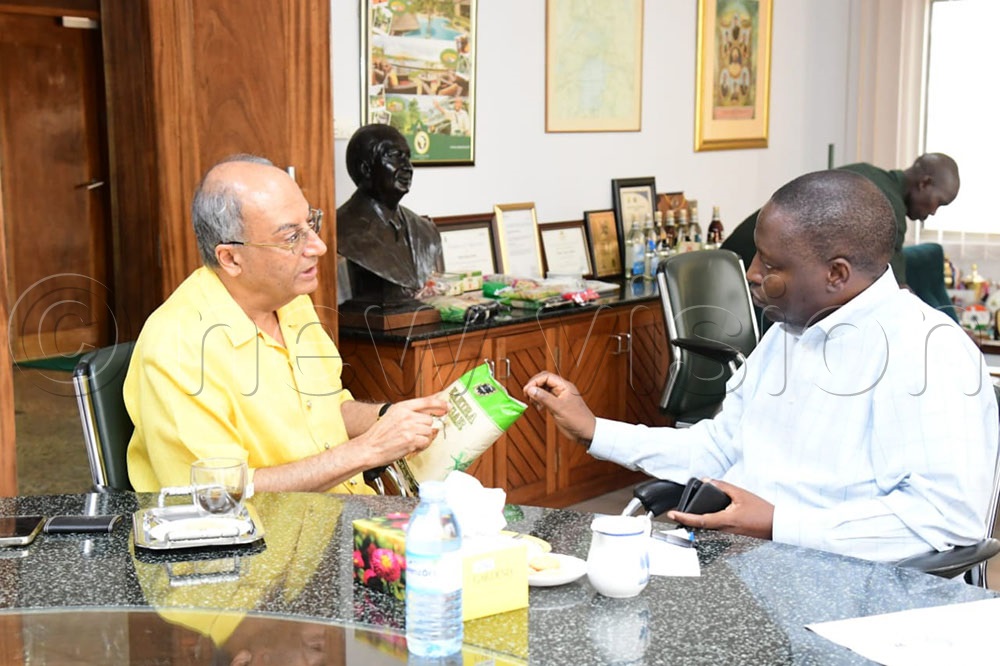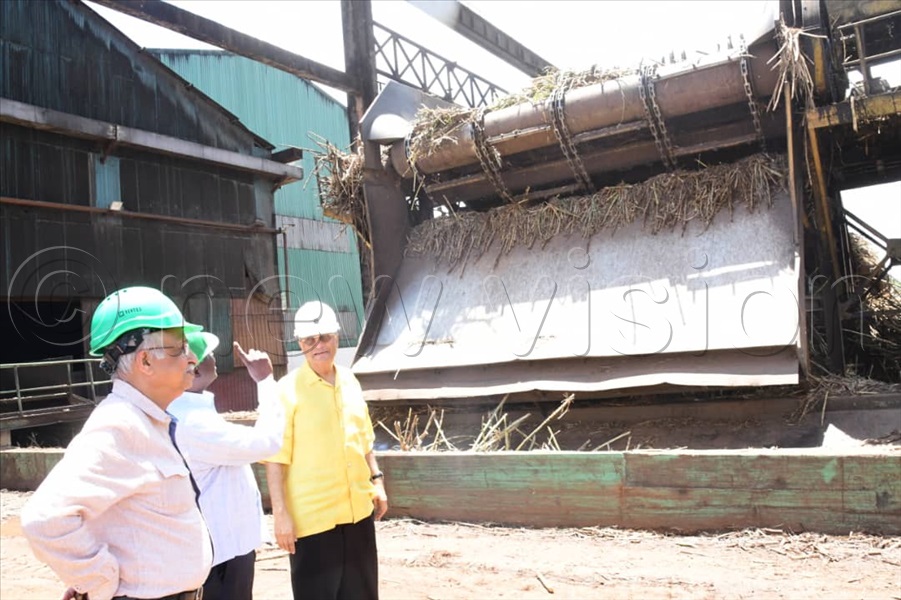Restrict establishment of sugar factories without nuclear farms – Kakira
Apr 18, 2024
Minister Bahati said his visit followed numerous concerns and challenges they were facing and decided to go and listen to their issues. “We have listened to their complaints, and we are going to act soon”.

The Kakira Sugar Limited joint managing director, Kamlesh Madhvani, and the state minister for industry, David Bahati (R) chat after touring KSL in Jinja district on Friday, April 12, 2024. (Credit: Eddie Ssejjoba)
NewVision Reporter
Journalist @NewVision
_____________
Jinja-based Kakira Sugar Limited (KSL) has appealed to the Government to come up with a policy restricting sugarcane millers from setting up factories without a nuclear farm.
According to Kamlesh Madhvani, Joint Managing Director (JMD) of KSL, setting a factory anywhere without a nucleus farm and buying from any farmer due to policy guidelines causes periods of excessive supplies of sugar, which pushes the price down and shortages in some periods, again pushing the price.
Bahati commended the company, saying it was one of the leading sugar growers and leading to growth of the country’s economy by paying taxes and providing jobs to citizens. (All Photos by Eddie Ssejjoba)
He said this was not good for the country and not good for planning and often leads to inefficient use of resources, adding that Uganda needs some strategic guidelines, which should be spearheaded by the Government where sugarcane millers are compelled to have a certain amount of sugarcane within their nucleus estate of about 50% and then source the rest from our growers.
Kamlesh said that to deal with food shortages in the Busoga region, the government needed to encourage farmers to set aside land for growing food and other crops.

State minister for industry David Bahati is shown samples of sugar after touring Kakira Sugar Limited in Jinja district on Friday, April 12, 2024.
“The Government needs to set policy guidelines that farm less than a certain acreage, say 20 acres, should only be encouraged to grow sugarcane and set aside for example five acres to grow other crops,” he explained.
He was on Friday, April 12, 2024, speaking after leading David Bahati, the state minister for industry, around the factory in Jinja. The company has 10,000 hectares as a nucleus farm and 16,000 hectares in Kayunga.
Kamlesh, who drove the minister around the huge factory in an electric tricycle said that the company encourages farmers to grow non-sugarcane crops.

A Kakira Sugar Limited employee shows the minister some of the spirits made from sugarcane and exported.
This followed a guideline by President Yoweri Museveni on the sugar industry when in March this year, he directed sugarcane companies to leave out buying from farmers with four acres or less, saying growing sugarcane was not good for them.
The President instead said that such small farmers needed to concentrate on intensive agriculture enterprises such as coffee, fruits, dairy, and poultry, among others.
He explained that Sugarcane can only make money if it is done on a big scale.
The policy, Kamlesh explained, will enable millers to have watertight agreements with farmers whereby they can extend services like supply of fertilizers, use of agricultural equipment to increase productivity of the land, and others that can, in turn, make the price of sugar more affordable than it is today.

Bahati commended the company, saying it was one of the leading sugar growers and leading to growth of the country’s economy by paying taxes and providing jobs to citizens.
He explained that lack of control gave an advantage to people to set up factories without their own nucleus estate and buy from anyone, which compromises on quality, giving a false impression to the farm that every type of cane can be bought.
He says the sugar policy should also direct investors on where they can invest, instead of setting up factories anywhere they do not have plantations.
“Let the investors go to the North, East, and West where there is plenty of virgin land and be encouraged to start their own estate and produce at least 50% of their sugar and persuade farmers to have medium-sized farms where they can also grow cash crops to avoid food shortage,” he explained.

Kamlesh said that to deal with food shortages in the Busoga region, the government needed to encourage farmers to set aside land for growing food and other crops.
He regretted that due to policies, this year Kakira will be producing below their target because of a shortage of canes. He said the company has 180,000 tons of sugar per year but that they will be able to produce 140,000 tons.
“So what we are suggesting is a change of policy and making sure that millers are tied to a certain number of out-growers so that they can plan to their capacity, they are obliged to buy all the sugarcane farmers grow, and the price formula should be such that the farmer gets a good price for the sugarcane,” he said, adding that this enables the miller to get a secure supply of good-quality cane, creating a win-win situation.
Kakira was also not expecting much export because Kenya where they have been selling much of the sugar produced had unfortunately made it very difficult for the Ugandan sugar to enter their country.

They have imported from all over the world, but they have slapped duties on fellow East Africans like us without any explanation. This is known to people of the highest level in Uganda,” he explained, adding that this was a matter between the two governments and was being handled at the highest level.
Bahati commended the company, saying it was one of the leading sugar growers and leading to growth of the country’s economy by paying taxes and providing jobs to citizens.

Madhvani leads industry state minister David Bahati around the Kakira sugar factory.
He said, “It is one of the companies that have stood the test of time, and it is a model in our economy”.
The minister said his visit followed numerous concerns and challenges they were facing and decided to go and listen to their issues. “We have listened to their complaints, and we are going to act soon”.
He said they also agreed on the composition of the board that it must have stakeholders as well, and that there was an error committed in the formula of the pricing, which he said would be amended.

Minister Bahati (L) asked Kakira to consider producing fertilizers after it was discovered that sugarcane byproducts can make good fertilizers.
He encouraged them to start producing industrial products and assured them that there was enough demand. He pledged that the ministry would work on putting in place a sugar board, which he said is responsible for the formation of a policy that will respond to all their concerns.
He asked Kakira to consider producing fertilizers after it was discovered that sugarcane byproducts can make good fertilizers.
“I recently received some investors who showed interest in partnering with sugarcane millers to start producing fertilizers from sugarcane and we are further discussing this matter seriously because this will also help our soils to increase agricultural production,” he said.

He added, “We are planning to have two consultative meetings and then request the President to convene a caucus of NRM members of parliament and after that, we take it back to parliament, mainly that is why we are here.”

No Comment